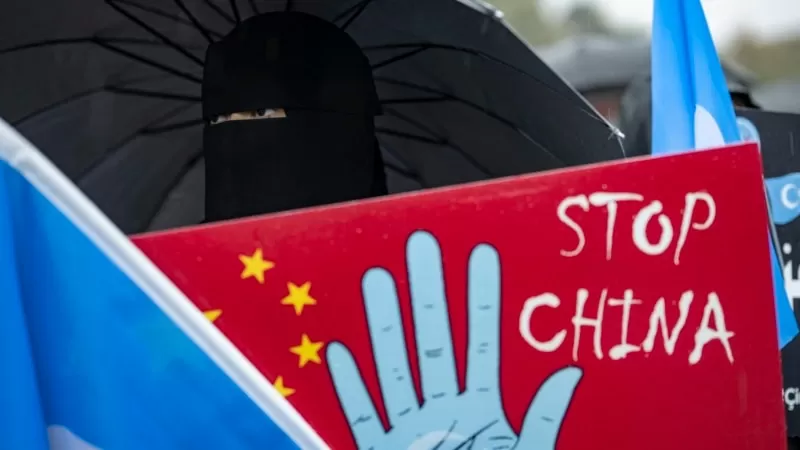Taipei, Taiwan – A new report has revealed that some global carmakers are facing pressure from the Chinese government, resulting in weaker human rights and responsible-sourcing standards in their joint ventures in China. This has raised concerns about the risk of forced labor from China’s Xinjiang Autonomous Region, where more than 1 million Uyghurs and other ethnic minorities have been subjected to mass internment and other forms of persecution.
The report, titled “Asleep at the Wheel” and published by Human Rights Watch, highlights the failure of major carmakers such as Volkswagen, Tesla, General Motors, and Toyota to minimize the risk of Uyghur forced labor in their aluminum supply chain – a crucial material for automotive parts.
According to Jim Wormington, a senior researcher at HRW and author of the report, the multiple layers between car companies and aluminum producers create an opacity that benefits the car industry. This allows them to purchase materials without knowing their origin and the potential risks associated with sourcing from Xinjiang.
Recent investigations have uncovered evidence of forced labor in Xinjiang, with some research warning that certain industries, including the solar panel and auto industries, may be exposed to forced labor from the region.
With approximately 15% of China’s aluminum production sourced from Xinjiang, HRW found evidence through Chinese state media articles, company reports, and government statements that aluminum producers in the region are participating in labor transfers.
The report states, “The link between Xinjiang, the aluminum industry, and forced labor is the Chinese government-backed labor transfer programs, which coerce Uyghurs and other Turkic Muslim communities into jobs in Xinjiang and other regions.” It also reveals that aluminum smelters in Xinjiang have been involved in labor transfers, as shown by evidence from Chinese government sources.
Due to the difficulty in determining the exact amount of aluminum sourced from Xinjiang, as it is often mixed with other metals to make aluminum alloys in other parts of China, the links between Xinjiang and supply chains are further obscured.
HRW has identified at least three aluminum producers or smelters in Xinjiang, including Xinjiang East Hope Nonferrous Metals, Tianshan Aluminum, and Xinfa Group Xinjiang, as either receiving labor transfers targeting Uyghurs and other ethnic minorities or being closely linked to Xinjiang Production Construction Corps, which plays a key role in the repression of Uyghurs in the region.
In response to criticism of facilitating forced labor in Xinjiang, the Chinese Embassy in Washington has denied the accusations, calling them “a lie of the century fabricated to smear China.” They also stated that the workers in Xinjiang have their rights guaranteed and accused some in the United States of using human rights as a means to disrupt international trade and undermine the stability of industrial and supply chains.
However, Human Rights Watch argues that global carmakers have a responsibility to identify, prevent, and mitigate the presence of forced labor in their supply chains, as mandated by the United Nations.
When questioned about the potential links between their Chinese joint venture and an aluminum producer in Xinjiang, Volkswagen claimed they have limited capacity to address their Chinese joint ventures’ supply chain links to the region. They stated that they are not legally responsible for human rights impacts in their joint venture’s supply chain, as Germany’s supply chain law only covers subsidiaries in which companies have decisive influence.
Similarly, Tesla also stated that they have no transparency about the supplier relationships of their Chinese joint ventures. This lack of transparency and fear of retaliation from the Chinese authorities make it challenging for carmakers to conduct audits in China.
However, Wormington from HRW believes that there are ways for carmakers to demand more information from Chinese suppliers about their supply chain. He suggests that carmakers can ask their suppliers to provide more information on their supply chain, as Chinese carmakers want access to global markets.
Some foreign jurisdictions, including the United States and European Union, have enacted or are planning to pass laws that require businesses to disclose their supply chains and identify potential links to human rights abuses. Some governments have also imposed import restrictions to prevent products connected to forced labor from entering their countries.
Despite these efforts, some analysts believe that businesses need to clearly express their concerns to Beijing. William Nee, research and advocacy coordinator at Chinese Human Rights Defenders, a U.S.-based activist network, suggests that businesses should make it clear to the Chinese government at the highest level that forced labor in their supply chains is a problem that needs to be addressed.
Y


